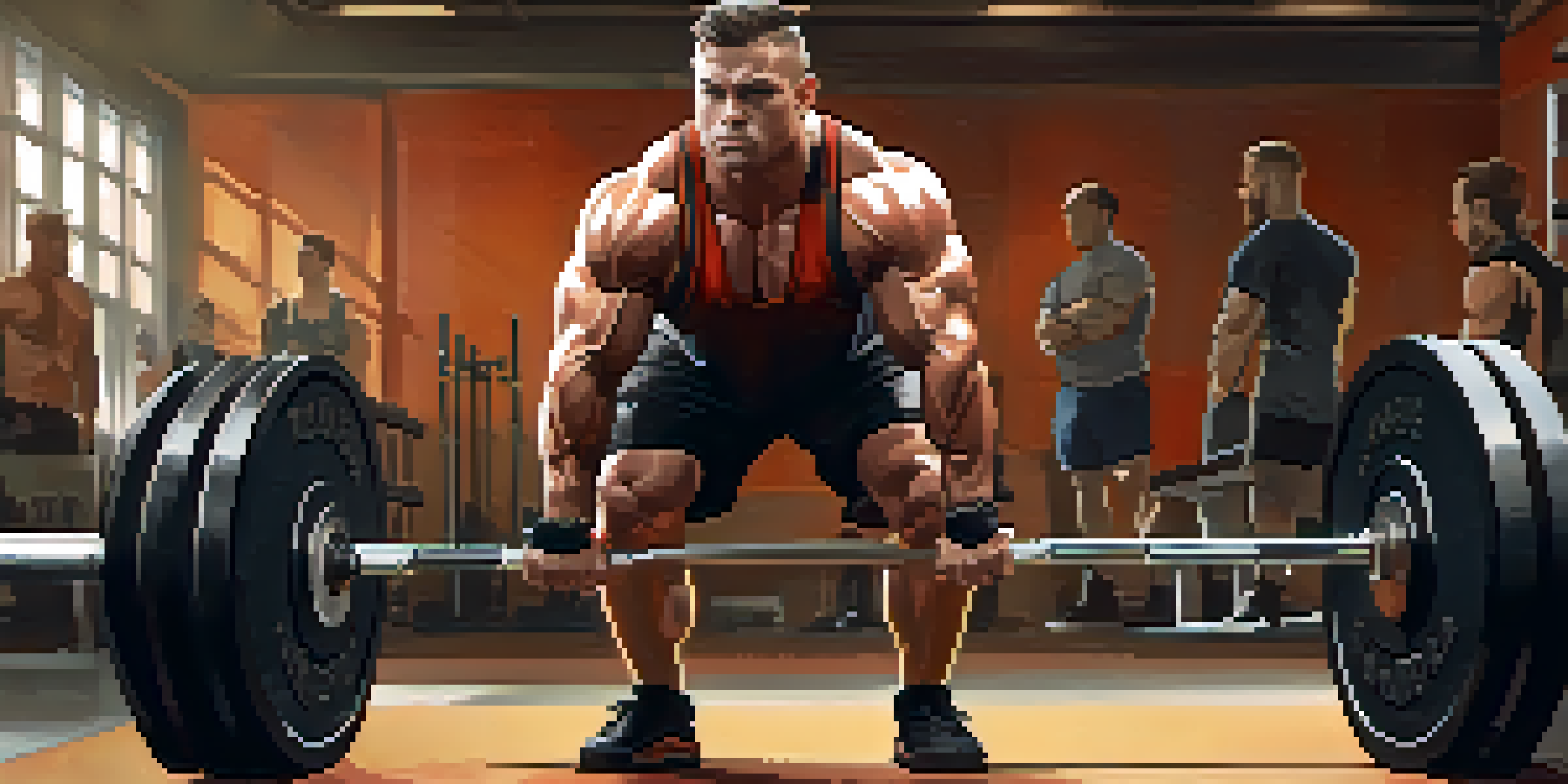Nutrition Trends for Powerlifters: Fueling Performance

Understanding the Powerlifter's Nutritional Needs
Powerlifters have unique nutritional needs that go beyond just calories. Since their goal is to maximize strength, they need to focus on specific macronutrients: protein for muscle repair, carbohydrates for energy, and healthy fats for overall health. This balanced approach ensures they can lift heavier and recover faster.
You are what you eat, so don't be fast, cheap, easy, or fake.
It's not just about what you eat, but when you eat it. Timing your meals around training sessions can enhance performance. Consuming a protein-rich meal after workouts helps in muscle recovery, while a carb-heavy meal before lifting fuels the body with the energy it needs.
With the right knowledge, powerlifters can tailor their diets to meet their goals. Understanding these nutritional needs is the first step to optimizing performance and achieving personal bests.
The Rise of Flexible Dieting in Powerlifting
Flexible dieting has gained popularity among powerlifters for its adaptable nature. Instead of strict meal plans, it allows individuals to enjoy a variety of foods while still meeting their macronutrient goals. This approach can make sticking to a diet more enjoyable and sustainable.

For example, a powerlifter might enjoy their favorite pizza while still hitting their protein and carb targets for the day. This flexibility can help maintain motivation and prevent the burnout that often comes with rigid dieting.
Nutritional Balance is Essential
Powerlifters need a balanced intake of protein, carbohydrates, and fats to maximize strength and recovery.
Ultimately, flexible dieting encourages a healthier relationship with food, allowing powerlifters to enjoy their meals without feeling deprived. It's a trend that promotes both performance and well-being.
Popular Supplements: What to Consider
Supplements can play a significant role in a powerlifter's nutrition plan. Common options include protein powders, creatine, and branched-chain amino acids (BCAAs), which can enhance recovery and support muscle growth. However, it's crucial to choose high-quality products and understand their benefits.
Nutrition is not just about eating, it's about learning to live.
For instance, creatine is well-researched and known for improving strength and power output. Taking it consistently can lead to better performance in the gym, allowing for heavier lifts and more effective training sessions.
Despite the benefits, supplements should not replace whole foods. A balanced diet rich in nutrient-dense foods should always be the foundation, with supplements used to fill in the gaps as needed.
Hydration: The Unsung Hero of Performance
Hydration is often overlooked but is vital for optimal performance in powerlifting. Dehydration can lead to decreased strength and endurance, making it essential for lifters to stay hydrated before, during, and after workouts. Water intake should be prioritized, especially in hot environments.
Additionally, some powerlifters incorporate electrolyte drinks to replace lost minerals during intense training sessions. These drinks can help maintain hydration levels and support muscle function, which is crucial during heavy lifts.
Flexible Dieting Enhances Enjoyment
Flexible dieting allows powerlifters to enjoy a variety of foods while meeting their macronutrient goals, making it easier to stick to their diet.
By making hydration a priority, powerlifters can ensure they perform at their best. It's a simple yet effective way to enhance performance and recovery.
Meal Prepping: A Game Changer for Lifters
Meal prepping has become a game changer for many powerlifters. By preparing meals in advance, lifters can ensure they have nutritious options readily available, which helps them stick to their dietary goals. This can save time during busy weeks and prevent the temptation to opt for unhealthy convenience foods.
For example, setting aside a few hours on the weekend to cook and portion meals can set a lifter up for success throughout the week. It allows them to focus on their training without the added stress of daily meal planning.
In essence, meal prepping not only supports consistent nutrition but also promotes better eating habits and overall health, making it a valuable strategy for powerlifters.
The Role of Plant-Based Diets in Powerlifting
Plant-based diets are increasingly popular among athletes, including powerlifters. These diets focus on whole, plant-based foods that can provide ample nutrients while still supporting strength training. Many powerlifters find they can achieve their protein goals through a variety of plant sources, such as legumes, quinoa, and tofu.
Adopting a plant-based approach can also lead to improved recovery times and reduced inflammation, thanks to the abundance of antioxidants found in fruits and vegetables. This is particularly beneficial for powerlifters who need to recover quickly for their next training session.
Hydration Boosts Performance
Staying properly hydrated is crucial for powerlifters, as dehydration can negatively impact strength and endurance during workouts.
While some may worry about protein intake on a plant-based diet, it's entirely feasible to meet nutritional needs. With careful planning and a focus on diverse food sources, powerlifters can thrive on a plant-based diet.
Listening to Your Body: The Key to Nutritional Success
One of the most important aspects of nutrition for powerlifters is tuning into your body's signals. Everyone's body reacts differently to various foods and diets, so it’s essential to pay attention to how certain meals affect performance and recovery. This personalized approach can lead to better outcomes.
For instance, some lifters may find they perform better with higher carb intake, while others might thrive on a more balanced macronutrient ratio. Experimentation and self-awareness are vital to discovering what works best for individual needs.

Ultimately, listening to your body can help powerlifters make informed dietary choices that align with their goals and promote optimal performance. It's about finding the right balance for each unique athlete.